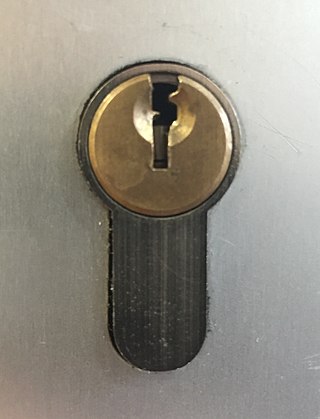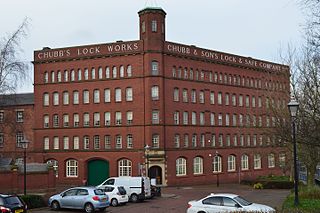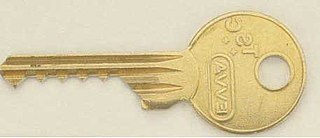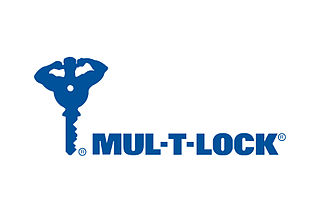Related Research Articles

Lock picking is the practice of unlocking a lock by manipulating the components of the lock device without the original key.

The pin tumbler lock, also known as the Yale lock after the inventor of the modern version, is a lock mechanism that uses pins of varying lengths to prevent the lock from opening without the correct key.

A disc tumbler or disc detainer lock is a lock composed of slotted rotating detainer discs. The lock was invented by Finnish founder of Abloy, Emil Henriksson (1886–1959) in 1907 and first manufactured under the Abloy brand in 1918.

A combination lock is a type of locking device in which a sequence of symbols, usually numbers, is used to open the lock. The sequence may be entered using a single rotating dial which interacts with several discs or cams, by using a set of several rotating discs with inscribed symbols which directly interact with the locking mechanism, or through an electronic or mechanical keypad. Types range from inexpensive three-digit luggage locks to high-security safes. Unlike ordinary padlocks, combination locks do not use keys.
Assa Abloy AB is a Swedish Group whose offerings include products and services related to locks, doors, gates, and entrance automation. Related products and services include controlling access and confirming identities with keys, cards, tags, mobile, and biometric identity verification systems.

A lock is a mechanical or electronic fastening device that is released by a physical object, by supplying secret information, by a combination thereof, or it may only be able to be opened from one side, such as a door chain.

Bitting is the depth of key cuts on a cylinder key for a pin tumbler lock, often expressed as a number. Bitting also refers to the combination of key cuts on a bit key for a warded lock or lever tumbler lock.

Chubb Locks is a former brand name of the Mul-T-Lock subsidiary of the Assa Abloy Group, which manufactures locking systems for residential, secure confinement and commercial applications. When the brand licence expired in 2010 the name ceased to be used, with the same locks sold as Yale or Union locks.
Tor Sørnes was a Norwegian author, politician, engineer and the designer and inventor of the VingCard, the first recodable keycard lock and the magnetic stripe keycard lock.

Lock bumping is a lock picking technique for opening a pin tumbler lock using a specially crafted bump key, rapping key or 999 key. A bump key must correspond to the target lock in order to function correctly.

Kwikset is an American lock and lockset manufacturer owned by Assa Abloy. Originally Gateway Manufacturing Company, Kwikset was founded in California in 1946 by Adolf Schoepe, and Karl Rhinehart.

A snap gun, also known as lock pick gun, pick gun, or electric lock pick, is a tool that can be used to open a mechanical pin tumbler lock without using the key. A thin steel blade, similar in shape to a lock pick, is inserted into the lock and the snap gun briefly fires the blade against all of the lock pins simultaneously, momentarily freeing the cylinder and enabling it to be turned using a tension wrench. The snap gun is an alternative to a conventional lockpick, which requires other techniques such as raking to free the pins.

An interchangeable core or IC is an adaptable locking key cylinder, which can be rapidly exchanged in the field via the use of specialized "control keys".

Bilock is a high-security keying system designed and manufactured by Australian Lock Company. It is advertised to be bump-proof, pick-resistant, and drill-resistant. The Bilock cylinder uses a patented locking system with two sidebars, 12 pins, and 12 springs. In the New Generation Bilock, a trigger pin has been added to increase security and extend the registered design of the product. The key design is a U-shape profile with six cuts on each side of the key, along with a central roller to activate the trigger pin in the front and center of the cylinder.

A magnetic keyed lock or magnetic-coded lock is a locking mechanism whereby the key utilizes magnets as part of the locking and unlocking mechanism. Magnetic-coded locks encompass knob locks, cylinder locks, lever locks, and deadbolt locks as well as applications in other security devices.

Yale is a lock manufacturer and a subsidiary of Assa Abloy, except in the United States and Canada where the brand has been owned by Fortune Brands Innovations since 2023. The global company is headquartered in Stockholm, Sweden. Its initial product was the Yale lock, invented by Linus Yale Sr., and it became the foundation of the enterprise founded by Linus Yale Jr. and Henry R. Towne.

A lockset is the hardware and components that make up the locking or latching mechanism that can usually be found on a door or other hinged object but can also include sliding doors and dividers. The components of a lockset can include the door handles, latch bolt, dead bolt, face plate, strike plate, escutcheon, thumbturn, push button, turn button, and other trim. The lockset and associated hardware typically defines a door's function and how a user could access the two adjacent spaces defined by the opening associated with the lockset.

Mul-T-Lock is an Israeli company that develops and sells padlocks, combination locks, and related security products. It was founded in 1973 by Moshe Dolev and Avraham Bahry and is a subsidiary of Assa Abloy. Four years later, in 1977, Mul-T-Lock introduced the telescopic pin technology and entered the cylinders market.

VingCard Elsafe, whose origin was in Moss, Norway, is an international producer of hotel locking systems, electronic in-room safes and energy management systems. After inventing the first mechanical hole card operated lock in 1976, VingCard was acquired in 1994 by ASSA ABLOY, and merged with the electronic safe producer Elsafe to form VingCard Elsafe in 2006. Since 2015 VingCard Elsafe is not an operating company, but a product brand within ASSA ABLOY Global Solutions. In 2024, Vingcard is re-launched.

August, Inc. is a San Francisco-based home automation company, focusing on Wi-Fi connected door locks and doorbell cameras. The company was founded in November 2012 by Yves Béhar and Jason Johnson.
References
- ↑ "NY Brooklyn Locksmith". Monday, 28 October 2019
- ↑ Medeco Readies Assembly-Line Fix for DefCon Lock Hack
- ↑ Researchers Crack Medeco High-Security Locks With Plastic Keys | Threat Level from Wired.com
- ↑ Keymaster
- ↑ "Medeco Bypass Details" (PDF). Archived from the original (PDF) on 13 July 2011. Retrieved 17 October 2009.